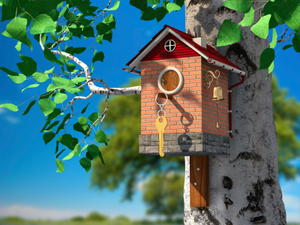Cost Accounting Basics
Cost accounting basics include capturing costs, organizing these costs and reporting these costs. That's really what it is. However, it can be made complicated with complex products and a large volume of business transactions.
To understand cost accounting basics lets keep it very simple
to start.Let's
assume you and I own a bird house manufacturing
company. We make the very best Tufted Titmouse
birdhouses in the
world. However, we are just getting our business started and
we
only have a few costs to start. These costs include:
We estimate that we can manufacture and sell 40 birdhouses in one day
or 800 in a month.
So what are
our costs to make a birdhouse:

So,
if we add up all our costs for one birdhouse we come up $14.26 per
birdhouse. Excellent, now we know what it costs to make one
of
our wonderful birdhouses.
Cost
accountant types use these cost accounting basics to organize costs into three
basic categories:
But,
don't let this confuse you. Accountants have an easier way to
look at these costs. They think of each of these costs as a bucket.
Think of three buckets on the floor. One labeled
direct
material, one labeled direct labor and one labeled burden.
Now
let's
throw our costs to make a birdhouse into the correct bucket:
So, after organizing our costs they look like this:
You
may be asking yourself why we bother to put costs into different
buckets. The simple answer is so we can analyze these costs
and
determine better ways to run the business.
For example:
Assume that our assembly labor person can make 50% more
birdhouses in the same amount of time. Let's see what happens
to
our costs:
We
now make our birdhouses for $11.84 instead of $14.25. I hope
you
can see the advantage to organizing our costs. Look at how
each
category of cost acted when we increased our production. If we are able
to manufacture another line of birdhouses without increasing our burden
costs, then our burden costs per birdhouse would go down for all the
birdhouses we manufacture. Since it still costs us $3800 per month for
our burden costs, these costs are then spread out over more birdhouses,
therefore, reducing the amount per birdhouse.
Cost accounting basics can be exciting when your analysis and hard work
results in cost improvements for the company. Also, when management
knows exactly what the costs are to make their
product, it can quote on new work and be certain of the profit it will
make. Many companies don't know what their costs are to make a product.
The ones that do know their costs have a tremendous advantage.